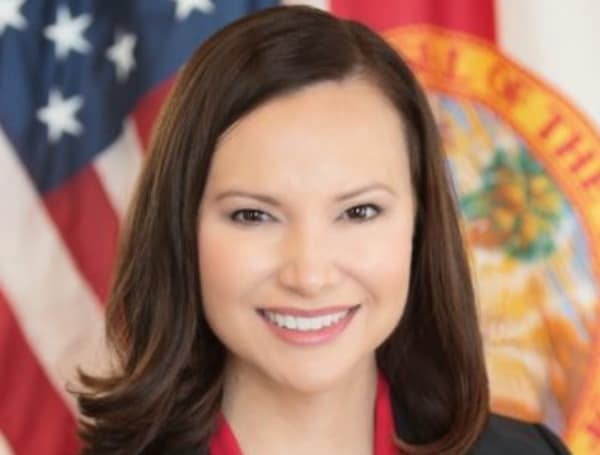Attorney General Ashley Moody’s office said late Tuesday that it thinks the Florida Supreme Court should reverse a decades-old position that a privacy clause in the state Constitution protects abortion rights.
Lawyers in Moody’s office addressed the issue in a 44-page document arguing that the Supreme Court should reject an effort by abortion clinics and a doctor to block a new law that prevents abortions after 15 weeks of pregnancy.
The privacy clause has played a crucial role in bolstering abortion rights in Florida since a 1989 Supreme Court ruling. Abortion opponents have long argued that the clause was not meant to protect abortion rights — a position that Moody’s office took in Tuesday’s filing.
The filing said the 1989 decision, in a case known as In re: T.W., was wrong “from the start.”
“It ignored that the (constitutional) provision’s plain text says nothing of abortion, that its drafters publicly disavowed guaranteeing abortion rights and that the provision was ratified in response to decisions restricting informational privacy,” said the document, filed by state Solicitor General Henry Whitaker and other lawyers in Moody’s office. “Were this (Supreme) Court to address the meaning of the Privacy Clause here, it should therefore recede from its precedents and clarify that the original meaning of the clause has nothing to say about abortion— and certainly that the Privacy Clause is not so clear as to pry the abortion debate from the hands of voters.”
In the news: Polls Show Tight Race For Florida Governor Between DeSantis And Crist
At another point in the document, Moody’s office expressed confidence that the court “is likely to hold that the Privacy Clause of the Florida Constitution does not limit the Legislature from regulating abortion.”
Such a ruling would be a seismic legal shift about abortion rights in Florida and would come after the U.S. Supreme Court in June overturned the landmark Roe v. Wade decision.
The Florida Supreme Court has become significantly more conservative since Gov. Ron DeSantis took office in early 2019. Three longtime justices who consistently ruled in favor of abortion rights, Justices Barbara Pariente, R. Fred Lewis, and Peggy Quince, left the court in 2019 because of a mandatory retirement age and were replaced by DeSantis appointees. Another DeSantis appointee, Renatha Francis, joined the seven-member court last week.
Tuesday’s filing by Moody’s office came after attorneys for seven abortion clinics and a doctor, Shelly Hsiao-Ying Tien, went to the Supreme Court to try to block the 15-week abortion limit, which DeSantis signed April 14. The law took effect July 1.
The clinics and the doctor filed a lawsuit June 1, and Leon County Circuit Judge John Cooper on July 5 issued a temporary injunction against the law, ruling that it violated the Constitution’s privacy clause. The state immediately appealed, which, under legal rules, placed an automatic stay on Cooper’s ruling — keeping the 15-week limit in effect.
A panel of the 1st District Court of Appeal rejected a request to vacate the stay and later overturned the temporary injunction. Attorneys for the clinics and the doctor are asking the Supreme Court to vacate the stay and reject the appeals court’s decision on the underlying temporary injunction.
In the news: Florida Couple Jailed After Starving Two Horses, One Emaciated Mare Euthanized
The privacy clause in the Constitution plays a key role in their arguments.
“Vacating the stay will ensure that, while proceedings in this (Supreme) Court continue, Floridians will be able to exercise their constitutional right to decide for themselves whether to have a pre-viability abortion or to carry a pregnancy to term — a right that, for decades, this court has repeatedly recognized the Florida Constitution confers,” the plaintiffs’ attorneys wrote in an Aug. 19 motion to vacate the stay.
The Supreme Court could decide the issues on more-narrow legal grounds than addressing the issue of the privacy clause. The appeals-court panel, for example, ruled that the plaintiffs could not show “irreparable harm” from the 15-week limit and, as a result, were not entitled to a temporary injunction.
The plaintiffs’ attorneys are disputing that conclusion at the Supreme Court, while Moody’s office contends the appeals court ruled correctly.
Visit Tampafp.com for Politics, Sports, and National Headlines. Support journalism by clicking here to our GiveSendGo or sign up for our free newsletter by clicking here.
Android Users, Click Here To Download The Free Press App And Never Miss A Story. Follow Us On Facebook Here Or Twitter Here.
Copyright 2022 The Free Press, LLC, tampafp.com. All rights reserved. This material may not be published, broadcast, rewritten, or redistributed.

